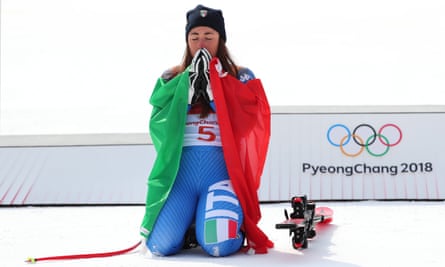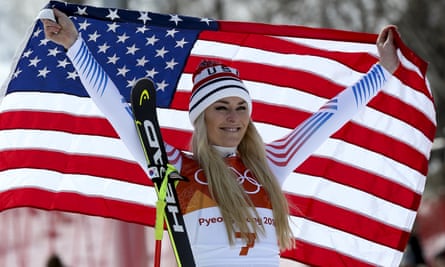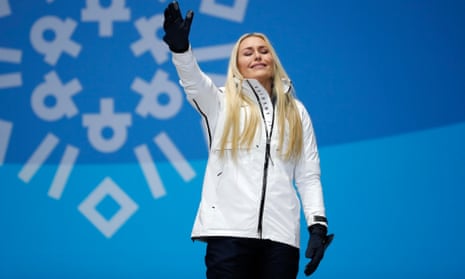Eight years of waiting came down to one hundred seconds on a sun-splashed, near-windless Wednesday morning in the Taebaek mountains. When it was over, Lindsey Vonn, the best women’s ski racer in history, was brought down with emotion. The long and crooked road from the Olympic downhill title she’d won eight years ago in Vancouver finally ended with a bronze medal that felt like a gold in light of the, shall we say, eventful interim. But the greatest skier the United States has ever produced was left with nothing even resembling a regret with the end of her Olympic career now within touching distance.
Unlike Saturday’s super-G when the 33-year-old American had drawn the No 1 bib and with it the unenviable task of racing first among the field, Vonn chose to start seventh – two places after Italy’s Sofia Goggia, the young racer with whom she has traded downhill wins on the World Cup circuit all season. It allowed her to watch the 25-year-old’s line and know the time she would most likely need to beat. Vonn made no major errors but still finished 0.47 seconds behind Goggia’s winning time of 1 min 39.22 sec.
Only an improbable effort from the Norwegian outsider Ragnhild Mowinckel nudged Vonn down to third, but still the history continues to topple down around her. Wednesday’s bronze makes her the oldest woman to ever win an alpine skiing medal at the Winter Games. No female skier has ever won more Olympic medals in the devil-may-care trade of downhill, alpine skiing’s most dangerous discipline, than Vonn’s two.
There might have been a third if not for the gruesome knee injury that dashed her Sochi dreams, amid a purple patch when Vonn, then 29, was “prime and ready” as US women’s speed coach Chip White wistfully recalled in Wednesday’s aftermath, postponing her next Olympic chance by four years. That injury, a torn ACL and MCL with a tibial fracture whose reinjury later that year cost her the Olympics, was followed by a fractured right humerus less than 21 months ago that left her unable to brush her teeth. And that’s to say nothing of the bouts of depression stemming from the divorce with her husband and coach and subsequent doomed tabloid-fodder relationship with a certain high-profile golfer.
But even as afflictions both physical and mental threatened to hijack the Minnesotan’s narrative, it’s Vonn’s ability to overcome them all that’s defined it, none more dramatically than Wednesday’s podium in Pyeongchang.

“Every single meal she’s eaten in the last two years is to build up to this moment. Every single gym workout. You don’t realize the amount of every single thing she’s done every day for the last eight years has been for this day and that two minutes,” Vonn’s sister, Karin Kildow, said near the finishing corral. “The emotion of it is kind of overwhelming.”
Vonn’s superhuman capacity for perseverance has been her calling card throughout her career, but even she has come to realize a fifth Olympics at 37 is a bridge too far. Although the qualifiers peppered throughout her remarks on Wednesday afternoon (“most likely”, “probably”) suggested a real-time grappling with the finality of the moment, a more reflective tack prevailed. This was it.
“I’ve never thought of quitting because of an injury, but it’s taken its toll. And that’s why I can’t keep ski racing,” she said, eyes growing misty as she spoke. “I think my injuries made me stronger, I do. Because I wouldn’t be the same person that I am today. When you’re young, you ski and you win and you don’t appreciate things. I’ve been in the fences so many times. I know so many doctors on a first-name basis it’s ridiculous. If you need any medical care let me know, I can hook you up with the right doctor.”
Vonn, for her outsized standing in the sport, remains the most human of champions, going about her trade with an emotional transparency almost unheard of among athletes of her caliber. “She never acts like she is on Olympus, where she could be,” Goggia said, when asked to assess her rival’s legacy. “It speaks for itself. She has [135] podiums, I have 20. She has 81 victories, I have four. She’s unbelievable.”

This is not the end for the 33-year-old. After Thursday’s long-awaited showdown with American team-mate Mikaela Shiffrin in the combined, where she has an outside chance of a medal, Vonn will return to the World Cup circuit where she’s five wins away from the biggest record of all: Ingemar Stenmark’s all-time mark of 86 victories.
But the Olympics are the Olympics.
“Yeah, I’m going to miss the Olympics and that’s one of the reasons why it was so emotional for me today,” she said. “I love racing in the Olympics. I love racing. I love being in the starting gate with so much pressure that you feel suffocated, but somehow you will yourself to give everything you have and you throw yourself down the mountain in hopes of a medal. I’m absolutely going to miss it.
“I wish could keep skiing. I wish my body didn’t hurt as bad as it does. I feel very lucky that I was able to ski my best today and that I was able to get on the podium in my last Olympic downhill. That’s something really special. I’m really thankful for that.”
Vonn’s biggest crime in the eyes of many back home during the run-up to Pyeongchang was saying what she thinks, a candor we bemoan our sports heroes for lacking until the moment it crosses our own beliefs. Many of the online cesspools otherwise known for Pepe the Frog memes have turned their crosshairs on Vonn since December, when she came under fire as the most prominent of a handful for US Olympians to speak out against Donald Trump.

Alpine skiing’s inherent unpredictability means its practitioners do more to manage variables than most other athletes but Vonn’s comments invited unspeakable online abuse, potentially complicating an emotionally fraught situation.
Instead she took refuge in family: her dad, absent for her Vancouver apotheosis due to a family squabble, was finally there alongside her two sisters. Missing was her paternal grandfather, who had been a mentor and passed away in November. She paid tribute to him with a skyward point as she crossed the line. (“I just wish he was here and I wish he could have watched me,” she said. “I think he still is.”)
And none of it affected her on Wednesday as the lioness in winter fired down the pristine white course flanked by mixed forests of larch, pine and broad-leaf oak trees, a gorgeous backdrop for the near-flawless run that offered up a memorable denouement in her signature event. She went out as she came in, the only way she knows how: true to herself.
“I think the Olympic gold in Vancouver set the course for my career,” she said. “I don’t think it necessarily means more or less to me than this medal now. But it’s just a different experience. I was on top of the world then and I still feel like I’m on top of the world right now because I’m out here doing what I love to do.”

Comments (…)
Sign in or create your Guardian account to join the discussion